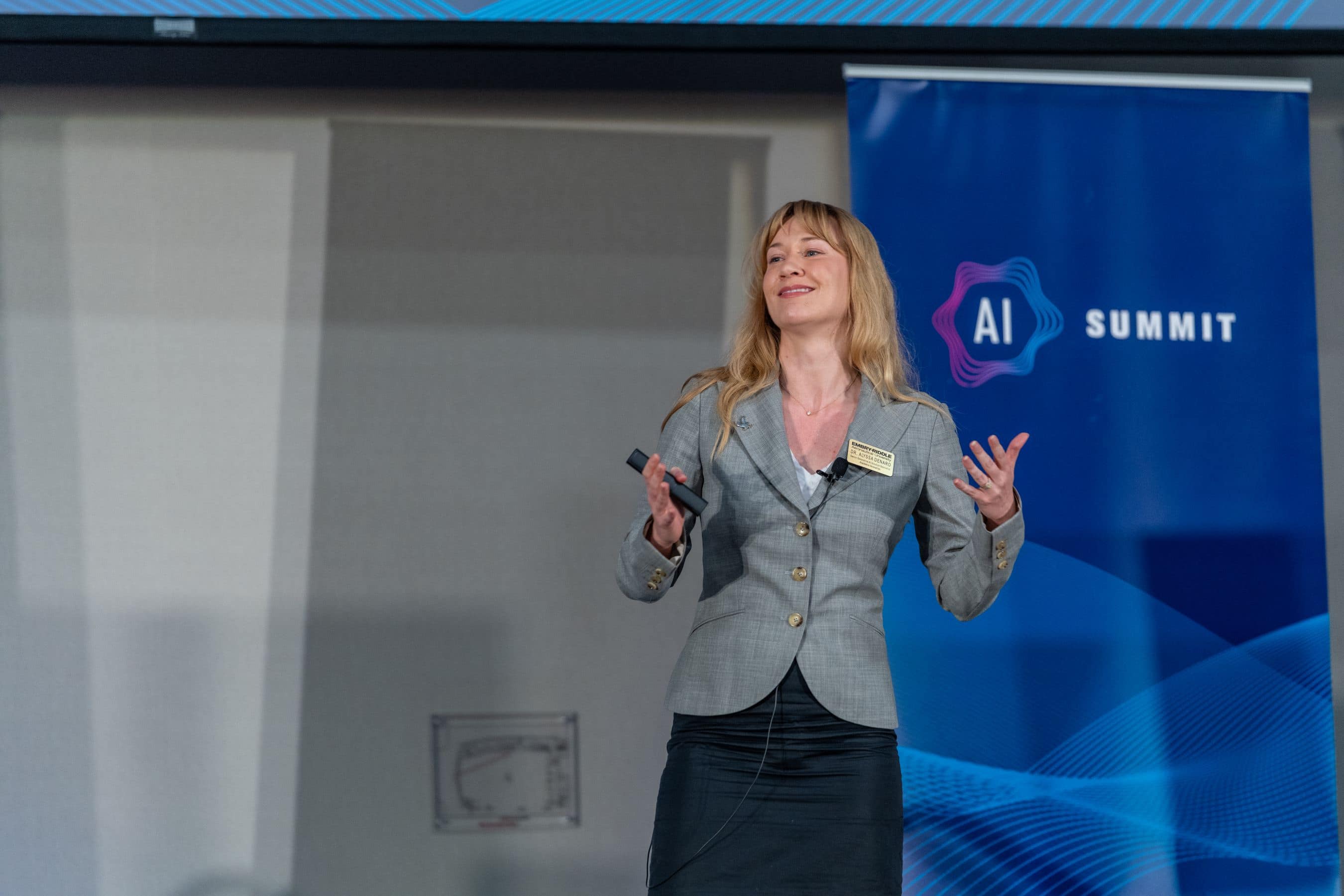Embry-Riddle’s AI Summit Examines the Technology’s Rising Impact in Academia, Industry

Featuring speakers and researchers from the Daytona Beach, Worldwide and Prescott campuses, Embry-Riddle Aeronautical University’s two-day AI Summit highlighted the growing role of artificial intelligence in higher education and the aerospace industry.
“AI is reshaping our world at a truly unprecedented rate,” Senior Vice President and Provost Dr. Kelly Austin told participants.
Embry-Riddle has always prepared the next generation of aerospace professionals by staying ahead of technological changes, which is why the university continues to explore ways to leverage the responsible use of AI across all colleges and campuses, he added.
“We are truly one university, and this gives us an opportunity to take pause and come together for a common cause,” Austin said.
This was the second year for the in-person and virtual event, which was held Nov. 4-5 at the Henderson Welcome Center. Expanding from one to two days, the AI Summit featured six interactive workshops and 14 presentations, highlighting AI research by faculty and staff. Additional researchers presented their AI work in a poster session in the center’s atrium.
Attendees also had the opportunity to test the Portable Cockpit Demonstrator, an AI-driven immersive system developed by the university’s Center for Aerospace Resilient Systems (CARS). In the demo, participants piloted a plane through a realistic flight scenario, then experienced a cybersecurity threat and saw how AI systems can detect threats and assist flight crews in responding to such incidents.
Dr. Dawn Armfield gave the summit’s keynote presentation, titled “Access, Accountability, and Ethics: Student Use of AI in the Classroom.” Armfield, an associate professor in the Department of Humanities and Communications at the Prescott Campus, talked about the ways she uses AI in her technical writing class and her research on using AI in the classroom.
“I see AI as a tool,” she said.
Armfield has her students discuss and vote on how they can best use AI responsibly. For example, many students find AI can be helpful for brainstorming ideas, offering grammar corrections and outlining papers. They also discuss inappropriate uses of AI, such as using it to complete entire assignments.

Dr. Alyssa DeNaro, the university’s senior Generative AI solution specialist, presents findings from a university-wide collaborative study on AI in teaching and learning conducted by the university’s Center for Teaching and Learning Excellence (CTLE). (Photo: Embry-Riddle/ Daryl LaBello)Dr. Alyssa DeNaro, the university’s senior Generative AI solution specialist, presented findings from a university-wide, collaborative study on AI in teaching and learning conducted by the Center for Teaching and Learning Excellence (CTLE). The study, titled “The State of GenAI at ERAU (2025): Adoption, Attitudes, and Next Steps,” was co-led by DeNaro; Joshua Caulkins, CTLE director at the Prescott Campus; Chad Rohrbacher, senior associate director of faculty mentoring; and Amy Cicchino, former CTLE associate director at the Daytona Beach Campus.
Faculty engagement with the technology has grown across the university, said DeNaro, with 55% of faculty survey respondents now reporting that they have an AI course policy, a 37% increase from last year. At the Daytona Beach Campus, 70% of faculty respondents agreed or strongly agreed that teaching students to use AI in their fields is essential, and 41% had course-specific AI policies.
The second day of the summit included a panel discussion titled “The Future is Now: How AI is Reshaping Our World,” with faculty and students talking about AI in higher education and research. Moderated by Dr. Jeremy Ernst, vice president for research and doctoral programs, the panel included DeNaro; Dr. Dothang Truong, associate dean of the School of Graduate Studies; Dr. Catalina Aranzazu-Suescun, assistant professor in the Department of Cyber Intelligence and Security; Prescott Campus student Emanuele Bossi; and Worldwide Campus student John Faraca.
DeNaro said AI literacy is important, particularly in understanding how critical thinking, judgement and ethics intersect with its use. The panel discussed how students can use generative AI tools without sacrificing critical thinking or skill development.
Bossi said AI can be a useful tool in some areas, such as coding or refining an idea, so students should be able to use it, as long as they are transparent and disclose that they have used it. Faraca agreed, saying AI should be used “as a starting point, not an end point.”
Academic integrity and intellectual property were popular topics as well. Truong said he has students use AI to do a literature review and find relevant references to write a research paper. AI can be especially helpful in research by efficiently sorting through large amounts of information and quickly finding appropriate sources on a topic.
However, Truong said his students found that AI can still make mistakes, such as creating fake sources with dead links or identifying real sources that credit incorrect authors. Those findings solidified for students that they still need to verify the information for accuracy.
“AI is a very productive assistant, but an assistant nonetheless,” said Truong.
Aranzazu-Suescun mentioned the growing risks AI poses for cybersecurity and data security concerns.
“Attackers can use AI to create even more sophisticated malware that’s harder to detect,” she said.
Panel members noted how industry is already using AI and is increasingly looking for AI-savvy graduates when hiring. AI adoption is widespread among students and faculty across all Embry-Riddle’s campuses, said DeNaro, who added that the university offers a variety of AI workshops and resources. The next step she would like to see is more “discipline-specific, hands-on practice” in AI to even better prepare students.
“It takes a lot of research and creativity,” she said. “But I would like to have that as a goal across our campuses.”

 Melanie Stawicki Azam
Melanie Stawicki Azam